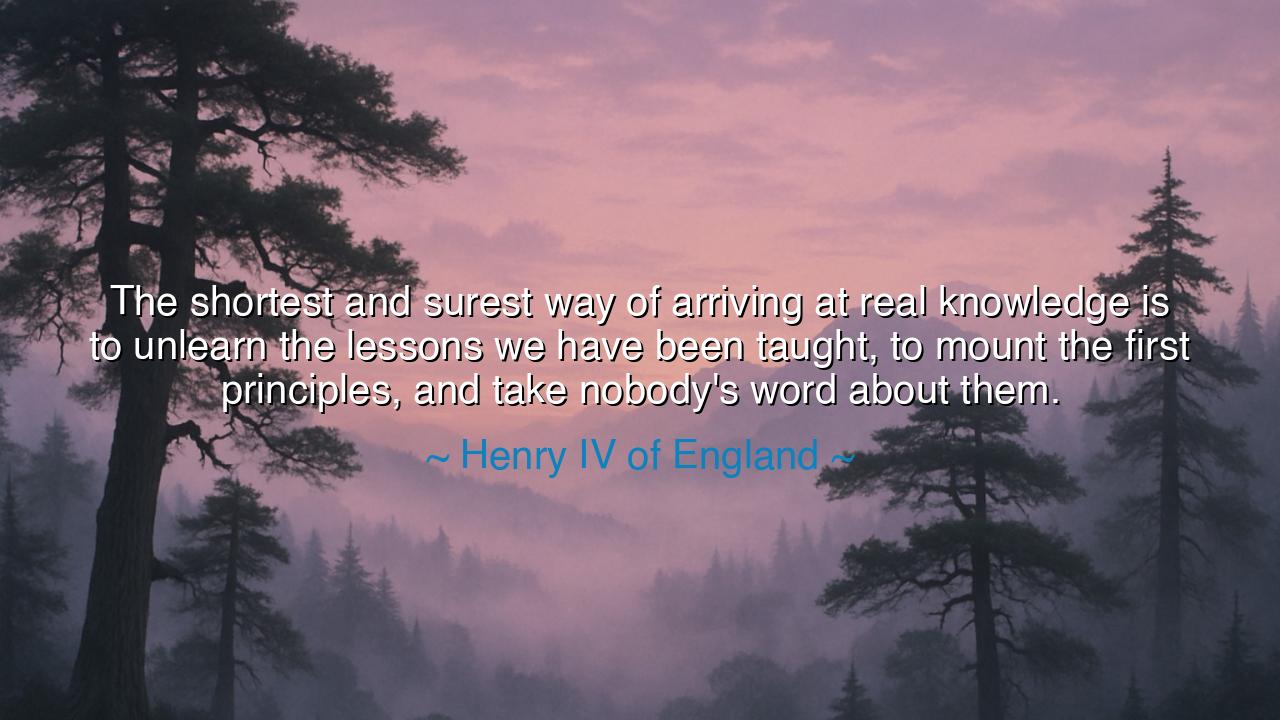
The shortest and surest way of arriving at real knowledge is to
The shortest and surest way of arriving at real knowledge is to unlearn the lessons we have been taught, to mount the first principles, and take nobody's word about them.






“The shortest and surest way of arriving at real knowledge is to unlearn the lessons we have been taught, to mount the first principles, and take nobody’s word about them.” — Henry IV of England
In this profound declaration, Henry IV calls upon the human spirit to cast off the chains of blind tradition and false instruction. He speaks not as a monarch, but as a philosopher-king—a man who knew that real knowledge is not inherited from others’ mouths, but discovered in the silence of one’s own soul. To unlearn is a sacred act: it is to cleanse the mind of error, to strip away borrowed truths, and to begin again at the foundation of understanding. The path to wisdom is not through accumulation, but through purification.
Every age is filled with voices that claim authority—teachers, rulers, institutions, even books. Yet, as Henry reminds us, truth cannot be handed down like a relic; it must be found anew by each generation. For what is learning, if it does not awaken the heart to question? What is obedience, if it blinds the mind to reason? To mount the first principles is to return to the source, to examine not what we have been told, but what is. It is the way of the philosopher, the seeker, the reformer—those who dare to look beyond appearances and find the eternal beneath the temporary.
Consider the tale of Galileo Galilei, who lived centuries after Henry but walked this very path. The world around him believed, as it had been taught, that the sun revolved around the earth. But Galileo looked through his telescope and saw with his own eyes that it was not so. The lessons he had been taught became chains that bound the truth; he had to unlearn them to see the cosmos as it truly was. His defiance of authority brought him suffering, yet his courage to “take nobody’s word” changed the course of human understanding forever.
This spirit of unlearning is the lifeblood of all progress. Civilizations grow not when they preserve every tradition, but when they have the strength to question those that no longer serve truth. The prophets, the inventors, the artists—all have been heretics in their own time. They shattered false wisdom to reveal the real. For to unlearn is to see freshly, and only through fresh eyes can one behold the world as it truly is. The one who merely repeats what he has been told walks in the footsteps of others; the one who questions walks his own path toward enlightenment.
Yet, Henry’s wisdom also carries a warning: to take nobody’s word does not mean to despise all teachers or reject all learning. It means to stand as a free mind, testing every idea against the measure of truth. It means to honor wisdom, not as an inheritance, but as a discovery. Even the words of the ancients, even the laws of kings, must bow before the evidence of truth. The shortest and surest way to knowledge is not through rebellion for its own sake, but through a pure and fearless inquiry that honors truth above authority.
In your own life, this teaching calls you to awaken from passive acceptance. Ask yourself: what beliefs have you received without question? What lessons have you swallowed that no longer nourish your spirit? Seek not the comfort of agreement, but the fire of understanding. Unlearn what was false. Return to first principles—to logic, to conscience, to direct experience. Be brave enough to stand alone in the light of your own reason. For it is better to walk in the uncertain dawn of self-discovery than to slumber beneath the false sun of borrowed truth.
Thus, let this wisdom echo in your heart: real knowledge begins when imitation ends. The path is narrow, yet it is royal. It is the journey of those who would rather know than merely believe. Be such a seeker. Cast off the weight of unquestioned lessons, mount the heights of first principles, and let no authority silence your search for truth. For the mind that dares to think freely becomes the truest sovereign—greater than any king, wiser than any age.






AAdministratorAdministrator
Welcome, honored guests. Please leave a comment, we will respond soon